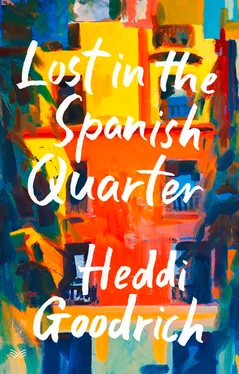I went in seeking refuge more than anything; I doubted this was the right church. There was nothing out of the ordinary about the place: just the usual tinted marble and frankincense, a few old women sitting in the pews fingering rosaries. One of the women got up and made a beeline for me.
“You’re here for the dead, aren’t you, my dear?”
“Actually, I am.” How could she tell? From my breathless entrance, or the fact that I’d neglected to puncture the surface of the holy water with my fingers?
“I’ll take you down.” She talked in a manner typical of Neapolitan widows, drawing out the syllables as if to mourn each and every one of them, yet she was smiling generously. As I followed the woman toward the altar, she turned to say, “You’re not from here.”
“No.”
At the far end she took me down a stairwell. It was musty and so dark that my feet had to make tentative guesses until, at the bottom of the steps, they hit packed earth. As I got used to the dim light, the space grew before me. A dirt path carved through piles of what my eyes could only see as kindling, unstable mounds pushed hard against the sandy walls of the cave. Above was a single hole of sunlight, a square choked with weeds. In that swampy light the mounds gradually, horrifically, began to take their true shape.
“Whose are they?”
“Only the good Lord knows,” said the churchwoman, her voice echoing. “They’re the unnamed dead. Folks who died in earthquakes. Or the plague. People used to drop like flies back then.”
Among all those random pieces of people, I could make out thighbones, vertebra, and smaller bones that might have been fingers. Only once had I looked death in the eyes, at my step-grandmother’s funeral, and it had stared back at me blankly, like a mannequin. I wasn’t afraid of death but only of saying the wrong thing, of taking the wrong step.
“Our women here dedicate their prayers to these people,” the woman added, “in the hopes they’ll see them in a dream.”
I went up to a particularly slender, curved bone. What had she meant by see them in a dream ? But when I turned around to ask her, she was gone.
Finally alone, I stepped deferentially through the cave. So the real church was down here. The path narrowed, the bones thickened. It was not scary but simply quiet, a stroll through a forest of felled pines, my trail scattered with branches, twigs, needles. But my imagination ran wild. Maybe one of Naples’s many cholera epidemics had killed a woman, perhaps married with two or three children, who then in the dead of night was thrown like a rag doll into that cave. Or maybe the volcano had sputtered during a Sunday market and a boy selling persimmons, hard new-season ones that make paper of your tongue, had suffocated in the poisonous gases. No, that was impossible: Mount Vesuvius had long been dormant; it was just a backdrop on the other side of the bay. Maybe an earthquake had toppled a wall on top of him, flicking the fruit like orange marbles across the street stones.
The dampness of the cave began to pinch my bones, an arthritic sort of feeling I knew well from years of living in unheated rooms where the paint peeled from the walls like bandages and the plaster still bore earthquake wounds that refused to heal over. I lingered in front of a coffin, built from wood that looked just as salvaged as the firewood the boys collected. I peered inside. Finding it empty filled me with gratitude mixed with an unspeakable disappointment. But just behind it was a much smaller coffin in a more advanced state of rot, only big enough for a baby.
I didn’t belong there, that was clear to me now. But I didn’t stop, for my eyes were too hungry, and eventually I came to a stack of skulls. They shone like varnished wood, as if caressed daily over the years; some were housed individually in crude wooden boxes with crosses gouged into them. I kneeled before one.
The face, the only earthly access to the soul. Big black eyes looked at me, astonished by their fate, the mouth releasing one long scream that I couldn’t hear. This was no longer an excursion and I no longer felt excited or even curious. I wanted to stay there with that person and find the courage to run my hand over their skull, like putting a baby to sleep, to watch over them as they slept. I wanted to prove that I wasn’t afraid of death because fate knew what it was doing. Didn’t it?
“Everything all right?” The churchwoman’s voice punched through the stillness. She’d obviously come to check on me, and perhaps I wasn’t even really allowed there on my own. “Each of these skulls is the responsibility of a parishioner,” she explained with a slowness that I now understood was not mourning at all but simply the effort to speak in Italian. “They take one or two in their care. It’s like they become part of the family. They clean the skull, build an altar. Every day they pray for that person to get out of purgatory.”
I listened without saying a word. I’d always pictured purgatory as something of a waiting room, and in my life I’d never known hell … or heaven, for that matter.
“Everybody needs somebody to look after them,” the woman went on, letting out a bit of Neapolitan this time. “Someone to hassle the heavens for them.” Some truths could only be spoken in dialect. If I’d been a Catholic I might have said amen . From my anthropological studies, I knew she was right—we are social creatures after all—yet I only grasped that her words were meant not for all of humanity but for me personally when she added in the raspy whisper of a smoker, “You got a boyfriend?”
“Me? No.”
It was the only possible answer, and yet at the same moment my heart leaped inside my chest. Because along with that no, which came out more like a protest than a fact, an image of Pietro had appeared before me with a clarity I didn’t think my memory was capable of. His lean body and solid gaze, his distinguished and slightly crooked nose, his mouth sealing a mysterious pleasure.
“Pretty little thing like you. There’s gotta be someone,” answered the woman, slipping into the dialect now like into a pair of old clogs and cradling my hand in hers, which were coarse and warm. “Someone’s waitin’ for you, I’d bet my bottom lira.”
A man waiting for me? I met the old woman’s eyes. There was something in them, a warmth easily tapped into with true-born Neapolitans that made me almost want to trust this stranger, in the middle of a mass grave, with the story of how someone had given me a gift that I couldn’t get out of my head. A young man whom I didn’t know and would probably never see again but who must have seen something—in me, in us —that I simply couldn’t see.
Instead I said, “I like being on my own.”
“On your own, huh?” She patted my hand—too hard, almost a slap—before letting it go. The moment was gone. And yet hadn’t she just read my mind—and maybe even my future?
Outside the cemetery, the sun was unbearably bright and the neighborhood unbearably alive despite the premature siesta, the closed shutters, the lazy graffiti. Did the streets even have names here? A shield of tears—of discomfort or emotion, it was hard to tell—welled up in my eyes, turning the neighborhood into a molten, unreal landscape. Was the world bending to my vision or was it my own very atoms whirling like a dervish and fusing with the world around me? For an excruciating and beautiful instant there were no boundaries. Anything was possible.
From: tectonic@tin.it
To: heddi@yahoo.com
Sent: January 3
Dear Heddi,
I should have written back earlier. I’m trying again now, for the hundredth time, unsure of whether I have mustered enough courage over the years to tell you the truth about my life.
Читать дальше












